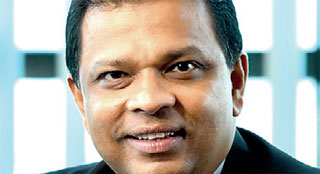Tuesday Feb 17, 2026
Tuesday Feb 17, 2026
Monday, 14 November 2022 01:58 - - {{hitsCtrl.values.hits}}
 |
| Chairperson Aruni Goonetilleke |
 |
| MD and CEO Jonathan Alles
|
Hatton National Bank PLC has posted a profit before tax of Rs. 12.4 billion and profit after tax of Rs. 10.5 billion during the nine-months which ended September 2022 while the Group recorded a profit after tax of Rs. 11.6 billion.
Chairperson Aruni Goonetilleke said: “Our performance under extremely turbulent conditions clearly demonstrates the confidence placed in us by our customers, the robustness of our business model and the focus and expertise of our team in navigating through intensified uncertainties.
I wish to extend my sincere gratitude to our customers, the entire HNB team, shareholders and all other stakeholders for their continuous support and reiterate our unwavering commitment on delivering long term value.”
The interest income of the Bank grew by 86% to Rs. 134.9 billion, primarily due to an increase of over 12 percentage points in average AWPLR during the period, in line with tight monetary policy measures adopted by the Central Bank. Accordingly, the net interest income of the Bank increased by 100% YoY to Rs. 71.1 billion in the first nine months up to September 2022.
The net fee income recorded a growth of 65% YoY to Rs. 11.0 billion largely due to higher trade and card income, compared to a subdued 2021. In addition, the Rupee devaluation by over 80% during the period resulted in an exceptional exchange income of Rs. 16.8 billion.
The 110% increase in total operating income to Rs. 99.7 billion was negated by the 438% increase in total impairment charge to Rs. 60.3 billion for the nine months. This included an impairment charge of Rs. 41 billion on account of the investments in foreign currency denominated government securities held by the Bank.
The net stage III ratio of the bank increased to 3.34% from 2.55% as at end of December 2021 as a result of the stressed market conditions, and the Bank recognised an impairment of Rs. 19.3 billion on account of loans and advances compared to Rs. 9.9 billion in the previous year.
HNB managed to curtail the increase in operational expenses at 27% YoY in the backdrop of a 70% YoY inflation and an 80% depreciation in the Rupee. The cost to income ratio improved to 22.9% for the nine-month period which is an improvement of 15 percentage points compared to the corresponding period of the previous year, supported by the significant growth in net income.
The bank’s asset base expanded by 20.2% to Rs 1.6 trillion during the nine months up to September 2022 while gross loans and advances rose by 13.1% to Rs. 1.1 trillion. Total deposits recorded a growth of 25.1% to Rs. 1.3 trillion during the nine-month period. HNB’s local currency deposits grew by 17.3% to Rs. 993 billion while the overall balance sheet growth was partly impacted by the significant devaluation of the currency.
Bank’s Tier I capital ratio and total capital ratio stood at 11.31% and 14.36%, against the regulatory requirement of 9.50% and 13.50%, respectively. CBSL has allowed flexibility for banks to drawdown the capital conservation buffer up to 250 bps, from the minimum stipulated requirements, considering the prevailing macro-economic challenges, the Bank has been able to maintain a strong liquidity position during the period with Statutory Liquid Asset Ratio (LAR) of 30.7% and all currency Liquidity Coverage Ratio (LCR) of 218.5% being well above regulatory minimum requirements of 20% and 90%, respectively.
Managing Director and CEO Jonathan Alles said: “The severe economic crisis the country is faced with today, has resulted in a myriad of challenges for the entire banking sector. Foreign exchange liquidity constraints impacting our ability to support customers is a major challenge. The banking sector has continued to support customers in need by extending capital and interest moratoria since 2019. Whilst we have witnessed a notable number of customers reviving their livelihoods, there are still a large number of customers in distress, resulting in increased pressure on asset quality.
“Stressed income levels, high interest rates, inflation and taxes continue to aggravate the situation as it hinders the repayment capacity of the customers. This has resulted in the need to make higher provisions on account of loan impairment. The impairments on investments in foreign currency denominated government securities is an additional burden on capital at a time not conducive for raising fresh capital.”
“While macro-economic uncertainties continue, we note the progress made by Sri Lanka with regard to its discussions with both public and private creditors. As the backbone of the economy, banking sector stability would be crucial to ensure the revival of Sri Lanka. As such, we strongly believe that the interest of the banking sector would be safeguarded to ensure that the country reaches its development goals under the IMF program,” he added.
He also said: “Despite the ongoing challenges, HNB has stood out in terms of its capital, liquidity, asset quality and efficiency levels. While we remain strong and stable, we will also ensure that our systems, processes and people are future- ready to deliver an enjoyable experience to our customers.”
HNB Group recorded a PBT of Rs. 14 billion and the bank accounted for 90% of the Group PAT of Rs. 11.6 billion for the nine months. Group PAT saw a drop of 13.2% compared to the previous year, due to the significant increase in impairment charges on account of investments in foreign currency denominated government securities as well as loans and advances. Group Assets increased by 19.5% to Rs. 1.7 trillion as at end of September 2022.